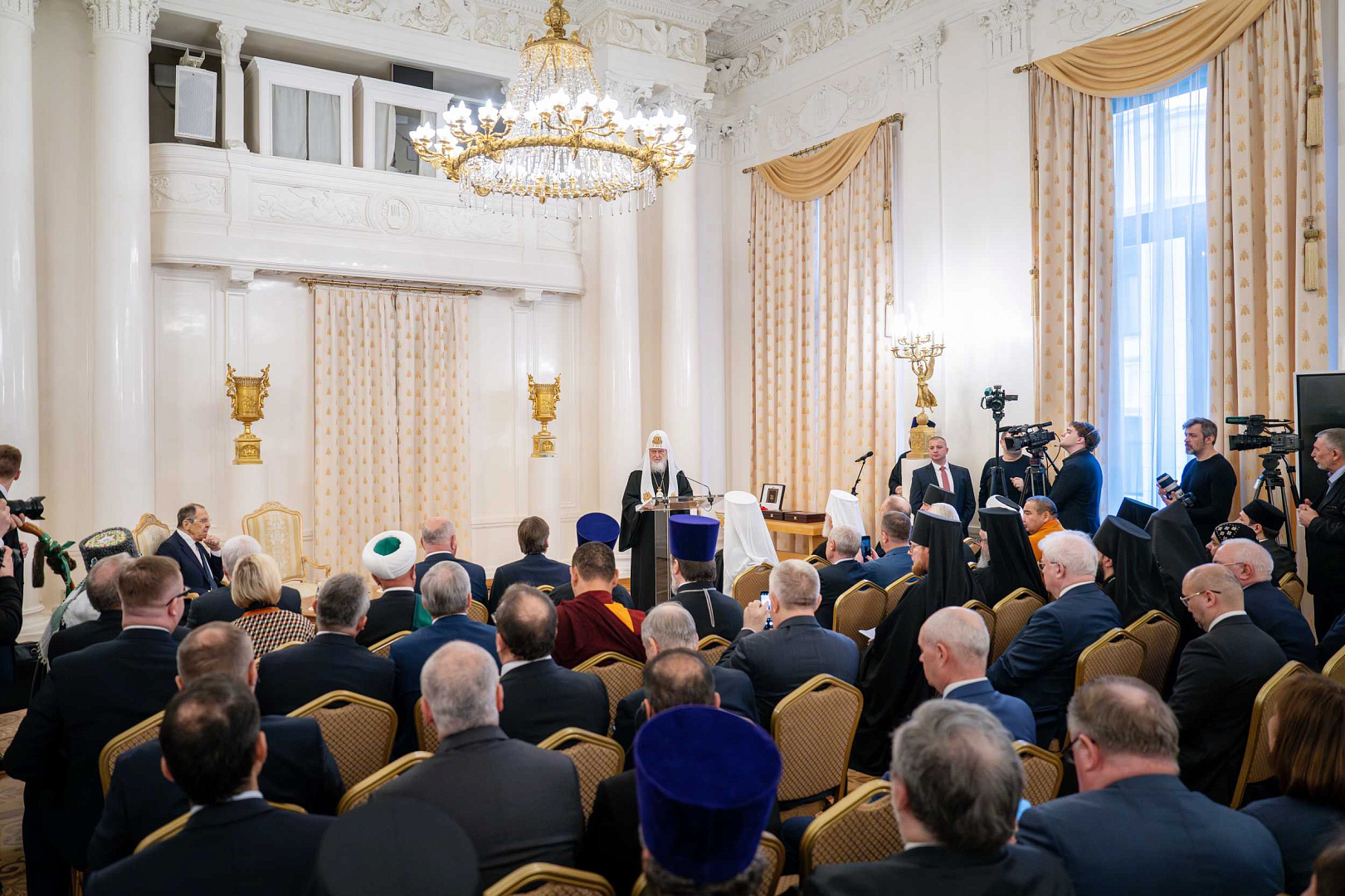Russian Orthodox Church Primate Attends Easter Reception at Foreign Ministry, Highlights Persecution of Orthodox Christians

DECR & OCP News Service – 22/05/2025
Moscow- Russia: His Holiness Patriarch Kirill of Moscow and All Russia attended a grand Easter reception hosted by the Russian Ministry of Foreign Affairs (MFA) at its Grand Mansion in Moscow on May 20, 2025. The event gathered a diverse array of religious figures, heads of foreign diplomatic missions, Russian and international diplomats, alongside representatives from various branches of the Russian government and public organizations.
Upon his arrival, the Primate of the Russian Orthodox Church was personally greeted by the Minister of Foreign Affairs of the Russian Federation, S.V. Lavrov. Several high-ranking Church officials were also present, including Metropolitan Anthony of Volokolamsk, Chairman of the Department for External Church Relations (DECR), and Metropolitan Pavel of Krutitsy and Kolomna, Head of the Moscow Patriarchate Administration for Dioceses in the Near Abroad. Representatives of Local Orthodox Churches under the Moscow Patriarchal Throne, such as Archimandrite Stefan (Dyspirakis) of the Jerusalem Church and Archimandrite Seraphim (Shemyatovsky) of the Orthodox Church of the Czech Lands and Slovakia, also attended.
The festive gathering featured Easter hymns performed by the Moscow Synodal Choir.
Lavrov and Kirill Address Current Challenges
In his address, Minister Lavrov congratulated attendees on the “bright Resurrection of Christ,” emphasizing it as a “symbol of spiritual renewal, hope and faith.” He also commemorated the 80th anniversary of the Great Victory and acknowledged the significant role of the Russian Orthodox Church during the Great Patriotic War in preserving the memory of fallen soldiers.
Turning to the situation in Ukraine, Lavrov stated that since the “violent seizure of power in 2014,” there has been a systematic elimination of anything connected with Russia, including the Russian language, culture, and media. He highlighted the ongoing persecution of the Ukrainian Orthodox Church (UOC), describing it as the country’s largest denomination, facing “legal liquidation” and continuous “seizure of churches, vandalism, attacks on priests and parishioners.” Lavrov cited as evidence the “blasphemous policy” of inventorying and verifying the historical and scientific value of saints’ relics at the Kiev-Pechersk Lavra, a task he noted was “entrusted to veterinarians.” He further asserted that such actions occur with the “connivance and even support of many European countries,” where “neo-Nazism and Satanism are raising their heads.”
Lavrov assured that “Russia will not leave the Orthodox people of Ukraine in trouble” and will work to ensure their rights are respected and that canonical Orthodoxy regains its central place. He underscored the Russian state’s commitment to combining its efforts with the Russian Orthodox Church in the international arena, noting the expansion of the Moscow Patriarchate’s creative activities globally, including the intensive development of Patriarchal Exarchates in Africa and Southeast Asia. He praised Patriarch Kirill’s efforts to strengthen Orthodox unity and protect Christians from terrorism, particularly in the Middle East, citing the situation in Syria.
Patriarch Kirill Calls for Defense of Religious Freedom
Patriarch Kirill, in his address, thanked the Russian MFA for reinstating the tradition of Easter receptions, which were paused due to the 2020 pandemic. He too emphasized the “significance of the 80th anniversary of the Great Victory,” achieved through immense heroism and sacrifice.
The Patriarch expressed deep concern over the “degradation of religious life and the destruction of the institution of the family” in Western countries, viewing these as dangerous processes. He specifically highlighted the “deepest concern about the situation in Ukraine,” where the Ukrainian Orthodox Church faces “threat of legal liquidation and the actual destruction of its communities.” He criticized Western countries’ “silence” regarding these violations of religious freedoms, noting that the situation is worsening with procedures to inspect religious organizations for “affiliation with the Russian Orthodox Church.” This, he argued, aims to deprive communities of their governing centers and liquidate them, forcibly driving them into schism. Patriarch Kirill stated that intense pressure on Orthodox parishes is observed in the Cherkasy and Chernivtsi regions, where “violent seizures of churches are especially numerous and brutal.”
His Holiness also pointed out that “persecution programs” initiated by “anti-Russian forces in the countries of the Western world” are being implemented in Moldova and the Baltic countries, particularly Estonia. He cited the April 9, 2025, adoption of amendments to the Law on Churches and Parishes by the Estonian parliament, which “outlaws the structures of the Moscow Patriarchate in the country.” Despite Estonian President Alar Karis not approving the law due to constitutional contradictions, the threat of its adoption remains. Patriarch Kirill stressed that Latvian authorities proclaimed “autocephaly” of the Orthodox Church by parliament, despite legal separation of church and state, calling it “a blatant fact of trampling on human rights, religious freedoms.” In Moldova, he noted increased political pressure on hierarchs of the Orthodox Church of Moldova, citing an incident during Holy Week where Archbishop Markell of Balti and Falesti was prevented from flying to the Holy Land for the Holy Fire.
The Primate urged the international community to provide an “adequate response and a fair assessment” to these “gross discrimination” challenges. He noted understanding from leaders of many world Christian and other religious communities regarding the Russian Church’s concerns.
Patriarch Kirill also touched upon inter-Christian contacts, highlighting productive cooperation with the Ancient Eastern Churches in Armenia, Egypt, Syria, Lebanon, Iraq, India, Ethiopia, and Eritrea, which he sees as strengthening ties between Russia and these nations. He also mentioned the work of the Christian Interfaith Consultative Committee and broader dialogue with non-Christian traditional religions.
The event concluded with the presentation of Patriarchal awards to several Russian diplomats. Notably, Russian Foreign Minister S.V. Lavrov was awarded the Church Order of the Blessed Prince Alexander Nevsky (1st degree) for his contribution to church-state relations and in connection with his 75th birthday.
Source: DECR
